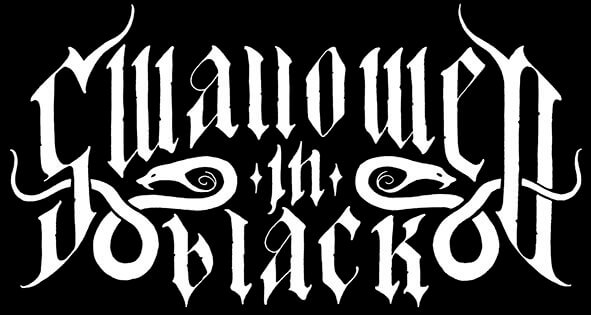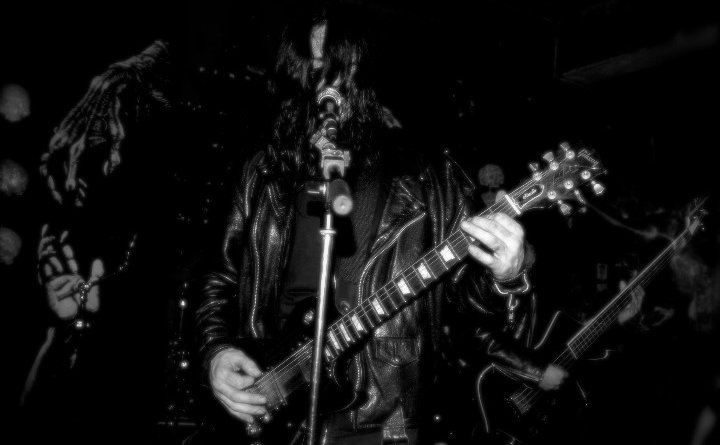“WE FIND IT IMPORTANT TO TRY AND FOLLOW OUR OWN PATH, REGARDLESS OF WHAT OTHERS ARE DOING” – NAMELESS VOID (NEGATIVE PLANE)
Weaving together a sinister sequence of nefarious deeds perpetrated on consecrated ground, Negative Plane’s ground-breaking third full-length, ‘The Pact…’, is a meticulously-crafted, genre-defining Black Metal monolith. Its creator-in-chief Nameless Void contemplates the genesis and implications of this immense, sprawling literary and musical masterpiece; the motives and fate of key characters The Bishop, The Architect, The Monk and The Traveler; why churches provide the ideal setting for acts of deception; the consequences of entering into deals with devils; the desperate and futile quest for validation of faith; the trials and tribulations of a protracted creative process; and the benefits of keeping good company and single-mindedly following one’s own path.
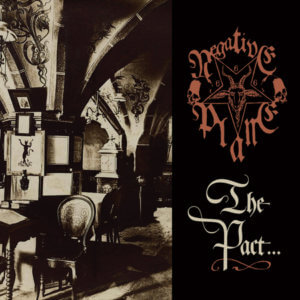 Navigating the epic flowing narrative of ‘The Pact…’, it’s impossible to ignore the omnipresence of insidious evil and moral bankruptcy presented at almost every juncture. It is also interesting that unlike in conventional storytelling, none of the characters are righteous or honest but instead seem motivated by either malice or self-preservation. In the sense that there exists no ‘good’ in these stories – just assorted shades of evil – does ‘The Pact…’ mirror the real world (or your interpretation of it) and the let’s say dubious nature of mankind?
Navigating the epic flowing narrative of ‘The Pact…’, it’s impossible to ignore the omnipresence of insidious evil and moral bankruptcy presented at almost every juncture. It is also interesting that unlike in conventional storytelling, none of the characters are righteous or honest but instead seem motivated by either malice or self-preservation. In the sense that there exists no ‘good’ in these stories – just assorted shades of evil – does ‘The Pact…’ mirror the real world (or your interpretation of it) and the let’s say dubious nature of mankind?
“Some of it does and some it doesn’t. I don’t think the real world is actually quite as bleak as it appears in ‘The Pact…’, but for the purposes of the album, I needed to make things that way, as it is a black metal album after all. I certainly do think that during the time periods in which the stories are set that a sizable portion of the clergy were motivated much more by the accumulation of wealth and power than by doing the Lord’s work, but I do also believe that there were probably a few people involved in the Catholic Church back then that were overall decent people.”
 Amid the blackened literary tapestry woven on this occult manifestation, those whose deeds ostensibly serve god – The Bishop, The Monk, The Architect and the church caretaker – are arguably the most cunning and despicable protagonists of all … and thankfully they get their comeuppance as the story unfolds and judgement is cast. When their faith is tested, they display no more belief in their convictions than the rest of us. Perhaps less. Frauds. I suppose it should come as no surprise that faith – a mere superstition, a form of insanity – turns out to be built on the shakiest of foundations?
Amid the blackened literary tapestry woven on this occult manifestation, those whose deeds ostensibly serve god – The Bishop, The Monk, The Architect and the church caretaker – are arguably the most cunning and despicable protagonists of all … and thankfully they get their comeuppance as the story unfolds and judgement is cast. When their faith is tested, they display no more belief in their convictions than the rest of us. Perhaps less. Frauds. I suppose it should come as no surprise that faith – a mere superstition, a form of insanity – turns out to be built on the shakiest of foundations?
“I don’t think that faith itself is something to despise, as most actions one takes are based on faith, but I don’t want to go too far down that rabbit hole at the moment. There is nothing wrong with having some faith in something greater than oneself, but it is also important to have a healthy amount of doubt and question things. However, most of the characters in the album have made faith their bread and butter, so to speak. For example, the character of The Archbishop in the second song is certainly one who does not accept doubt in other people, but has plenty of it himself, knowing that he does not really believe the things he preaches to the masses, and only has his exalted position due to his family’s wealth and influence. Also, the character of The Architect is interesting, because he also has the power and resources to build this great church and claims that its purpose is to praise God, but really it is built to serve his pride. He believes he can make a deal with the Devil and avoid consequences for himself because he justifies it by the excuse that he’s ultimately doing God’s work by building the cathedral, and so the ends justify the means in his mind. However, yet another part of him envies those who have true faith in God, which is why he places such a high value on it, as one sees by his various constructions in the cathedral.
“Regarding the character of The Monk, I would say that The Monk is a pretty tragic figure actually, as he is someone that has dedicated his life to the Church, and isn’t a hypocrite, like the Bishop, The Caretaker, or The Architect. He truly wants to believe in the Church’s teachings, and becomes more and more distraught when he cannot reconcile certain things with what he has been taught, and when he asks his superiors for guidance, he is simply rebuked and told to obey and not question things. His tragedy is when he starts to hear a voice that urges him to take extreme measures to rekindle his faith, and ends up ritualistically murdering someone. He was hoping that the Lord would stop him at the last second, like in the story of Abraham and Isaac, but that doesn’t happen, and he’s discovered in the church by the others covered in blood kneeling over the body with the knife still in his hand, and then handed over to the Inquisition to be tortured and burned. He has a terrible end, but I would not say he’s an evil person, just severely misguided.”
In contrast to the foul, nefarious and corrupt deeds of the unfaithful, the devil / The Traveler deals more liberally in truth rather than deception. Is the sincere and genuine darkness-dwelling devil in a way the hero of the piece? As in the most compelling horror movies and as depicted / celebrated in Metal music for decades now, the adversarial one – representing death and damnation, perhaps? – inevitably comes out on top. So could ‘The Pact…’ therefore be interpreted as a twisted and carefully-crafted exercise in devil (and death) worship?
“The Traveler serves mainly as a catalyst for various events in the storyline. Yes, he does also expose characters for who they really are, but he’s certainly not the hero of any story, and his character has little to no redeeming qualities. However, I would like to think that if any of the characters in the story had actually done the right thing when faced with certain death or damnation, he would have shown them mercy, and perhaps he did actually show a tiny bit of mercy to The Monk before his burning; possibly by giving him something to ease the pain before the fires were lit, and at least allowing him to see a vision of St Peter and the Devil vying for his soul, as The Monk wanted more than anything to see his faith validated during his lifetime.”
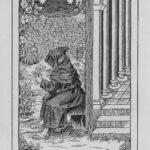 Although he meets with a tragic end – at least in the mortal realm – does that brief (redemptory?) glimpse granted to The Monk at death’s door reward his curiosity and his preparedness to think rationally and independently rather than remaining unquestioningly subservient? While convictions of the spirit and soul are obviously going to be rooted more in intuition than in anything factual or demonstrable, preaching or practising blind faith is wholly irrational and dishonest. By seeking truths and affirmation, The Monk’s doubts are resolved, albeit in a brutal manner. Has he achieved the certainty he sought, despite paying the ultimate price? And is this a classic case of ‘careful what you wish for’?
Although he meets with a tragic end – at least in the mortal realm – does that brief (redemptory?) glimpse granted to The Monk at death’s door reward his curiosity and his preparedness to think rationally and independently rather than remaining unquestioningly subservient? While convictions of the spirit and soul are obviously going to be rooted more in intuition than in anything factual or demonstrable, preaching or practising blind faith is wholly irrational and dishonest. By seeking truths and affirmation, The Monk’s doubts are resolved, albeit in a brutal manner. Has he achieved the certainty he sought, despite paying the ultimate price? And is this a classic case of ‘careful what you wish for’?
“Unfortunately for The Monk, he doesn’t get the peace and certainty that he longs for even in his last moments, as he still has enough of his faculties present to doubt his vision of St Peter trying to save his soul, as he thinks that this is possibly a result of his pain and maybe whatever was given to him before the fires were lit. At this point, he is totally broken, as he is left with the knowledge that he could have found the entrance to the sanctum without this needlessly elaborate and completely unnecessary ritualistic murder, which not only condemns him in this life, but the next one as well. And even if he would have found the sanctum below and explored it, and somehow not fallen into the trap down below, would he have found anything that would help him rediscover his faith? Most likely not. His big mistake here wasn’t doubting his faith, but not doubting and questioning the voice that promised him easy answers in exchange for a horrific act of murder.”
As a standalone literary work, ‘The Pact…’ is almost unparalleled in modern Black Metal. Cultes Des Ghoules’ ambitious play put to music ‘Coven, or Evil Ways Instead of Love’ is the closest reference point I can think of. Even without the records revolving, poring over the lyrics (and imagery) in the accompanying booklet in an experience in itself. The narrative is painstakingly crafted, from the language to the measured meter deployed – the work of a true wordsmith. However, as the album delivers a perfect combination of riveting storytelling and supreme musicianship. how important is it that the lyrics should not be separated from the music? Is this a musical expression first and foremost? Must the music and message be consumed and considered in tandem with one another?
“Yes, you are correct that it is a musical work first and foremost. I write the music first and then write the lyrics to fit the music, which is somewhat restrictive, but it also provides a framework for the lyrics as well. I think that the best experience for enjoying the album would be to listen to the music while reading the lyrics, but I also think that either the music or the lyrics can be enjoyed on their own without having the other present. I would even go as far as to say that if one can’t enjoy either listening to the music without knowing the lyrics or reading the lyrics alone without the music that there is something wrong with either the music or the lyrics.”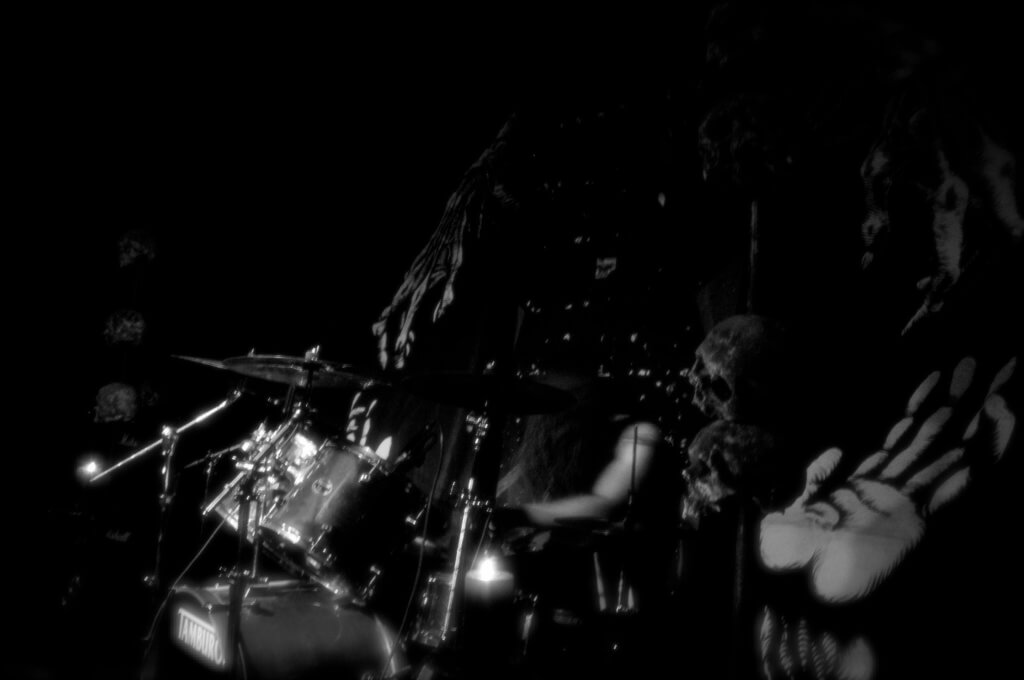
Nietzsche famously said that without music, life would be an error. How central a component has listening to, composing and performing music been in your own life journey to date? Also, sonically, Negative Plane is one of Black Metal’s most distinctive and instantly-recognisable bands, an outlier in that you have forged your own inimitable soundscape – are you completely comfortable being labelled as Black Metal and how much emphasis do you place on ignoring trends, expectations and conventions, charting your own path, and creating something unique?
“I would say at this point that music is the most important thing in my life, and I can’t imagine my life without it being there in some shape or form. Regarding whether we are comfortable being labelled as black metal, we feel that’s the most appropriate label for us, but I believe our definition of black metal is quite different from what people think of nowadays. When I think of the early albums from bands like Master’s Hammer, Samael, Rotting Christ and Mortuary Drape, for example, they were all black metal, but they all sounded radically different from one another, and it wasn’t until later that the whole boring homogenized sound came from everyone badly trying to copy what the Norwegians accomplished with their scene. So we consider ourselves black metal, but we hold ourselves to the standard of black metal that was established in the early ‘90s, rather than whatever people seem to think it is now.
“I guess that we sort of live in our own small world when it comes to current trends and whatnot, and even though we’re vaguely aware of what’s going on in the black and death metal scene, we choose to ignore it for the most part, and just do whatever makes sense to us instead. That’s not to say that we don’t have a few current bands that we are in contact with and respect immensely, like Malokarpatan, Head of the Demon and Cauchemar, for example. It’s just for the most part, we find it important to try and follow our own path, regardless of what others are doing.”
Definitely an approach that has worked extremely well thus far, with Negative Plane one of the very few Black Metal bands around that seems to meet with almost universal approval from those who take the time to investigate your work. As the band’s founder (an amazing 22 years ago already!), composer, main guitarist and vocalist (as well as other assorted instrumentation) and essentially chief artistic director, it is your vision that guides and shapes Negative Plane. However, you have also surrounded yourself with wonderful musicians to form a very strong musical unit. How critical are the contributions of Diabolic Gulgalta, Bestial Devotion and Thammuz to the rude health of Negative Plane and do you share common interests or activities outside of the band?
“The main creative dynamic is between Matthias (Bestial Devotion) and myself, as I usually run my ideas by him, and if he doesn’t think they’re good, I generally don’t keep them. In general, we’ll structure the songs together, and see if they work or not, or I’ll show him some ideas that I’ve already worked on with drum ideas of my own worked out on my keyboard. I also usually defer to Matthias when it comes to the artwork and the layout for the albums, as he’s quite passionate about things looking just right. However, each person in the band has their own band that they write everything for, so no one feels creatively unfulfilled. As to what we do together outside of the band, music related activities are mainly how we all get together, but we’ll also just get together either as a band or individually for a couple of drinks together at the local dive bar now and then, or visit someone’s place and just hang out and watch movies or listen to records. I think it’s important to be friends with the people that you play in bands with and be able to hang out outside of band activities as well.”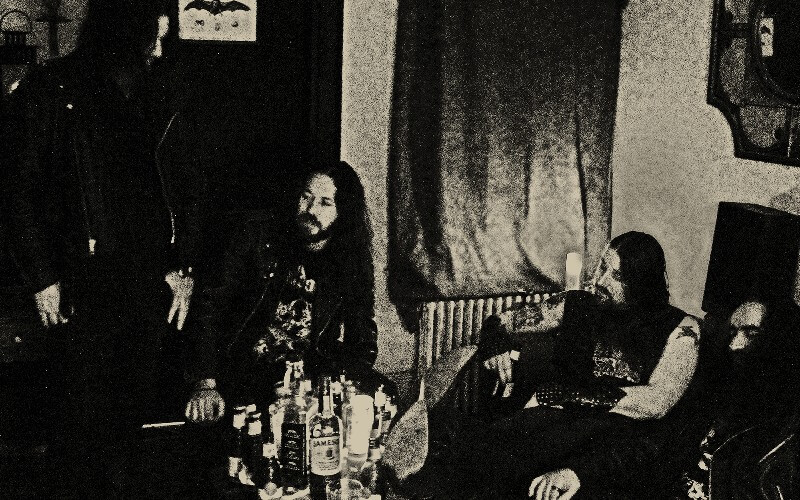
Conjuring a sprawling work of such scope, scale and ambition as ‘The Pact…’ became a personal labour of love that unsurprisingly proved enormously time-consuming. Does patience become a virtue during the creative process? As an artist, do you suffer much from anxiety, doubt or frustration during this critical time? I imagine there can be a strong temptation to force things rather than taking your time and waiting, perhaps indefinitely, for inspiration that in the worst case scenario may never come?
“Oh, I drive myself absolutely crazy trying to find just the right part for a song, and I constantly have doubt and anxiety as to whether something works or not. There were certainly lots of times that I wanted to force creativity and settle for something that I wasn’t totally satisfied with, but when I’ve tried that in the past, I eventually hated the part so much that I either fixed it, or threw the entire song away. And there were certainly times when I didn’t think I would be able to finish this album, but thankfully it all worked out in the end.”
At the heart of the debut LP, ‘Et in Saecula Saeculorum’, lies a thrilling triptych of songs – ‘A Church in Ruin’, ‘Death Mass’ and the utterly unnerving ‘Unhallowed Ground’ – that also juxtapose good and evil to similarly malevolent effect. Thus, although it is a self-contained concept album that stands as a masterful black mass monolith in its own right, in dealing largely with a recurring theme of unholy deeds enacted or occurring within church grounds, does ‘The Pact…’ also exist inextricably within the greater Negative Plane discography?
“‘The Pact…’ could not have existed without laying the groundwork for it on the first two albums, and those songs that you’re mentioning from the first album were definitely the starting point for me, in terms of using a church as a setting for some horrible deeds to take place. So yes, ‘The Pact…’ is in just the right place it needs to be in our discography.”
‘Unhallowed Ground’ deals with the Catholic Church’s perverse policy of rejecting the corpses of those who die with their souls eternally corrupted by original sin or mortal sin. Unbaptised babies or those who commit suicide, for example, couldn’t be buried on consecrated ground as they were deemed unworthy of a place in the kingdom of god. Kildemock Jumping Church is a law-of-physics-defying 14th-century Irish church ruin where the west gable of the building is said to have shifted inwards to exclude an excommunicated church member who had been buried inside the church walls against god’s wishes. I’m sure a certified structural engineer would come up with a more likely explanation for the curious angle this gable stands at today, but aren’t these legends and tales nevertheless fascinating?
“Oh, absolutely, and they allow for lots of artistic license to be taken as well, as I’ve certainly done so with songs like ‘Unhallowed Ground’. I was raised Roman Catholic, so I already have some of the basics of the religion ingrained in my mind, but it’s fascinating to read about some of the harsh rules imposed by the Catholic Church hundreds of years ago, as a way to maintain its influence and power over the general population under its jurisdiction. And what better way was there to assert control than by not only threatening punishment in this life, but also the next one as well, if one didn’t follow the rules given by the clergy? Of course, I’m sure there are some scholars of history that might take issue and contradict some parts of the lyrics here and there, but like I’ve said before, it’s a black metal song, not a documentary.”
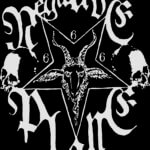 Like some form of automatic writing, much occult art emanates from the unconscious or subconscious part of the mind. Were you always in complete conscious control of the compositional side of things? Eighteen months have passed since the album was completed … when you examine the final result today, with the benefit of hindsight, can you specifically recall every detail of where the ideas came from, how they were executed, and think ‘I made that’, or is there a feeling that perhaps you served as an instrument, channel or vessel for a force beyond your understanding?
Like some form of automatic writing, much occult art emanates from the unconscious or subconscious part of the mind. Were you always in complete conscious control of the compositional side of things? Eighteen months have passed since the album was completed … when you examine the final result today, with the benefit of hindsight, can you specifically recall every detail of where the ideas came from, how they were executed, and think ‘I made that’, or is there a feeling that perhaps you served as an instrument, channel or vessel for a force beyond your understanding?
“I have a few memories of where I was and what I was doing when parts of the album were written, but I certainly don’t remember all of them, and I’m mostly at the mercy of whenever inspiration hits me. I’m not arrogant enough to claim that whenever I write something that it’s inspired by some amazing mysterious force, but I can also say that if I were fully in control of my creativity, I would have made a lot more music by now. So the short answer here is I just don’t really know.”
No doubt your reserves of inspiration were completely depleted during the arduous and exhaustive process of completing ‘The Pact…’. Have they been replenished in any way over the ensuring 18 months or so? Any creative juices flowing at the moment or any gigs in the pipeline? Or is it a case of expect the unexpected?
“Right now, I’m still pretty creatively drained, but there are some unused ideas that I haven’t been able to use yet, and that I don’t want to just disappear, so I guess we’ll just need to wait and see. I was thinking of just making a two- or three-song EP, but I’m not quite sure yet. In the meantime, we’re performing in Chile, Germany and Norway this year, so that’ll be enough to keep things going in the meantime.”
